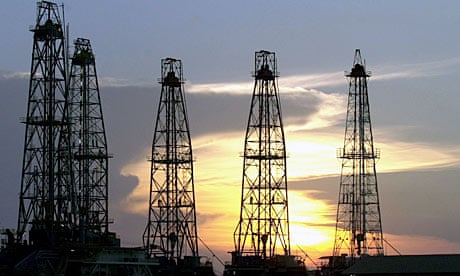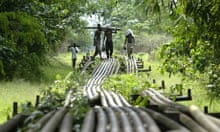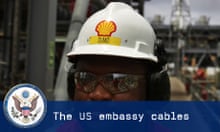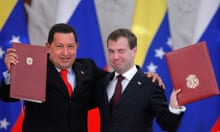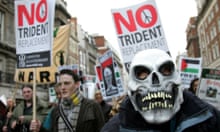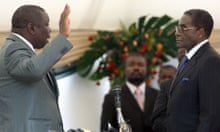Venezuela's tottering economy is forcing Hugo Chávez to make deals with foreign corporations to save his socialist revolution from going broke.
The Venezuelan president has courted European, American and Asian companies in behind-the-scenes negotiations that highlight a severe financial crunch in his government.
Venezuela's state-owned oil company, PDVSA, is the engine of the economy but buckled when given an ultimatum by its Italian counterpart and has scrambled to attract foreign partners, according to confidential US embassy cables released by WikiLeaks.
The memos depict an unfolding economic fiasco and suggest some of Chávez's key allies – Argentina, Brazil and Cuba – are gravely concerned at Venezuela's direction. "President Chávez, for his part, is acutely aware of the impact the country's general economic trajectory has had on his popularity," says one cable.
With a recession, underfunded infrastructure and 30% inflation, Venezuela's economic woes are no secret. But the government has insisted PDVSA, the country's golden goose, is thriving and capable of funding Chávez's vision of "21st century socialism".
Chávez took over the company and declared it a revolutionary instrument after defeating a management-led strike in 2003. He nationalised and expropriated swaths of the oil industry and said PDVSA would fill the slack left by departing foreign companies, declaring a triumph for sovereignty and socialism.
Analysts have suspected all is not well, citing corruption, broken rigs and unpaid suppliers, but the foreign oil companies still in Venezuela stay largely silent lest they anger the government and find themselves locked out of the western hemisphere's biggest energy reserves.
However, in separate private conversations with the ambassador, Patrick Duddy, industry figures detailed the parlous state of the industry. A senior manager from Chevron estimated the state oil company's output at 2.1m to 2.3m barrels per day, well below official declarations of 3.3m.
Chevron was funnelling profits to the US and no longer investing in Venezuela, the manager said. An executive at oil exploration company Baker Hughes Inc said the firm had a similar strategy and "received a congratulatory message from BHI corporate headquarters for not growing the business (and increasing its risk exposure)".
A director of Mitsubishi in Venezuela was quoted as saying Chávez's executives were struggling to attract investment. "[The businessman] stated that privately, senior PDVSA leadership is extremely upset with the failure of international companies to register bids. He added that Mitsubishi sent a letter to PDVSA explaining why the conditions offered by Venezuela were insufficient and what would need to be changed to make a bid commercially viable."
Italy's ambassador to Caracas, Luigi Maccotta, told his US counterpart that Italian oil company ENI squeezed PDVSA over an Orinoco belt deal in January this year knowing it had no one else to turn to.
The Italians delayed the signing by two days to reinforce the Venezuelan government's "need for ENI". Paolo Scaroni, the company's CEO, then faced down Venezuela's oil minister, Rafael Ramirez, over changes to terms and conditions.
"Thirty minutes before the ceremony was supposed to begin Scaroni told Ramirez: 'Take it or leave it, I can get on my plane and move on.' Ramirez apparently used that half an hour to convince President Chávez to accept all of ENI's proposed changes or risk losing the deal," according to the US cable. The Italians said they would not pay PDVSA a standard signing bonus because the company already owed them $1bn.
Venezuela's oil minister, who is the head of PDVSA, travelled to Moscow and Beijing hoping for solidarity deals with allies, only to find the Russians and Chinese as profit-minded as western companies.
Venezuela's oil travails, combined with rolling power blackouts, decaying infrastructure and expropriations, have worried its other friends. Jorge Taiana, Argentina's foreign minister, told a US envoy that Cristina Kirchner's government did not agree with Chávez's assault on the private sector. "Taiana said [former president] Péron had already gone through a nationalisation phase in the 1940s and the country had learned its lesson."
In a separate cable Marco Aurélio Garcia, a foreign policy adviser to the Brazilian president, Luiz Inácio Lula da Silva, was quoted telling the US ambassador that Venezuela had "deep domestic economic problems, particularly with regard to energy supply".
The head of the US interests section in Havana reported that the Castro government, which depends heavily on Venezuelan financial support, was fretting about its benefactor's economic health. "The view from the French is that Venezuela 'es en flames' and a source of serious concern for Cuba."
Chávez has brushed off claims of meltdown as capitalist propaganda, saying Venezuela's economy will emerge stronger than ever from current difficulties. The government is studying a draft law to facilitate further oil industry nationalisations to deepen the revolution.
Gianni di Giovanni, spokesman for ENI, said: "The facts and the conclusions reported in the WikiLeaks cable on Venezuela are false and without any grounds. The meeting between the Energy Minister of Venezuela Rafael Ramirez and ENI CEO Paolo Scaroni as well as the respective requests mentioned have never taken place."
